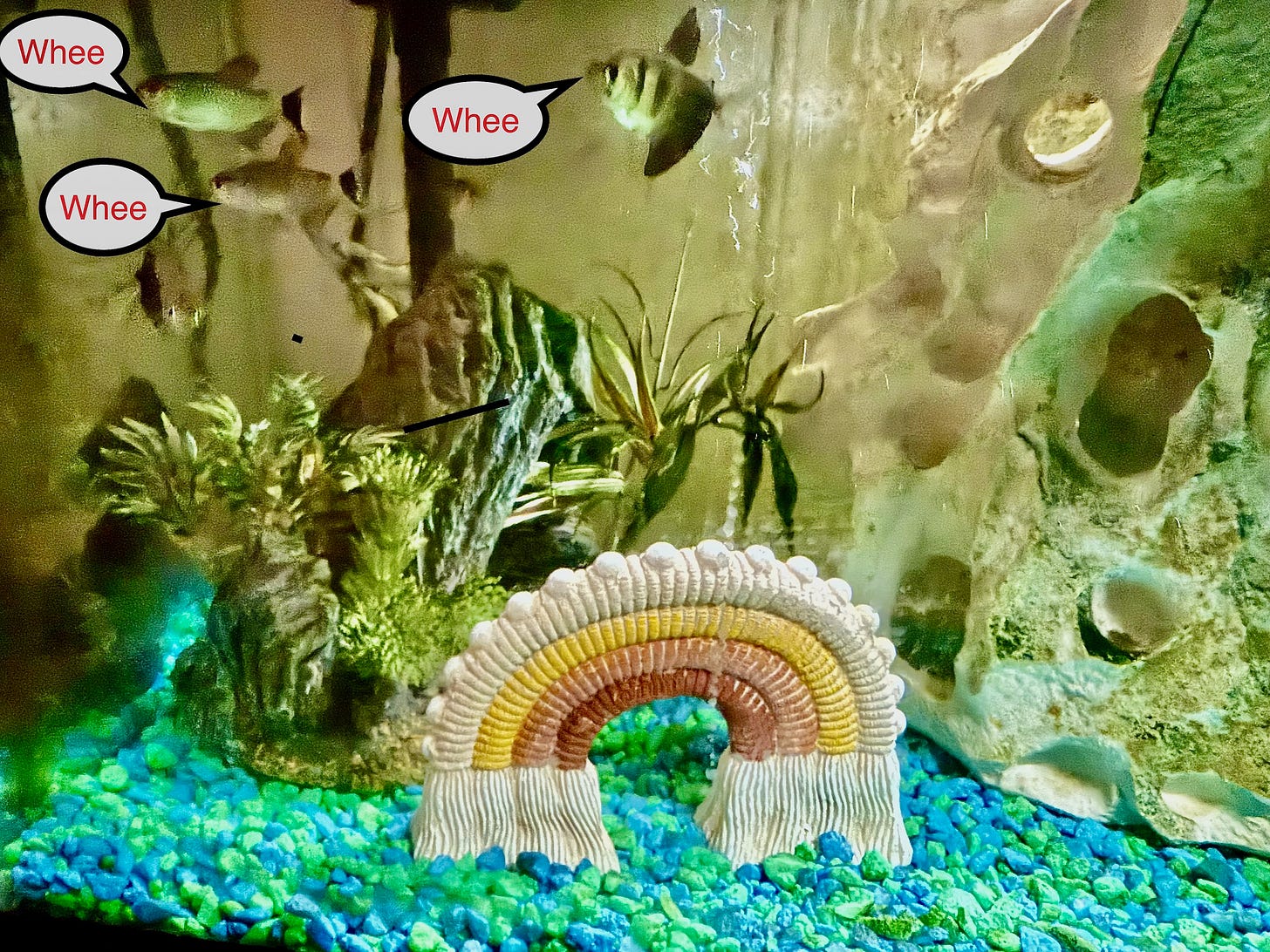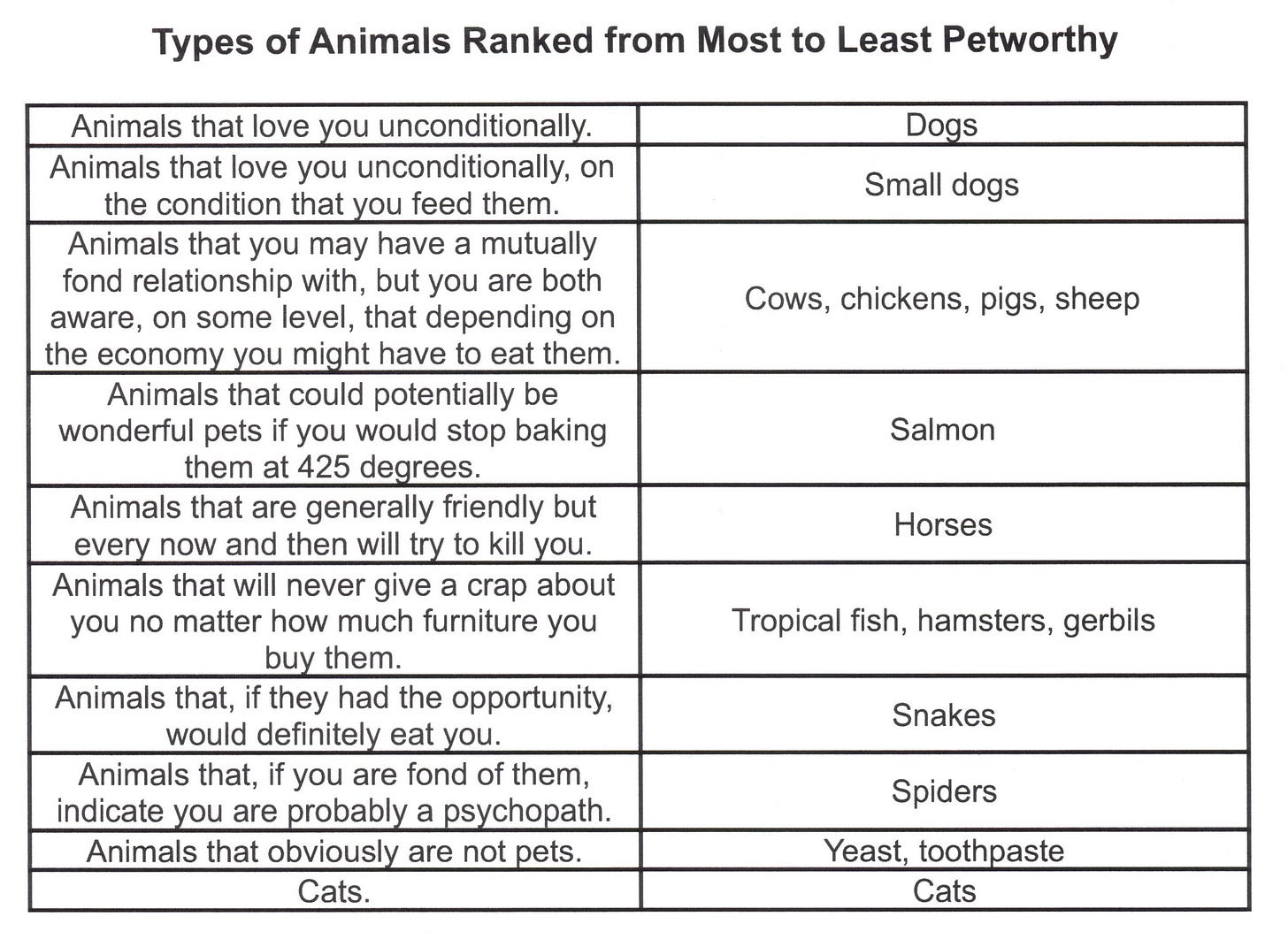Our household is currently dogless. It's been that way since the passing, back in January, at age 17, of Lucy, who it goes without saying was the Best Dog Ever, as well as the Dog Whose Face Whitened The Most Over Time.
The loss of Lucy means that, petwise, we're down to tropical fish. We have five of them. We've had them for what feels like decades. They are survivors. They are the Keith Richardses of tropical fish.
But the thing about tropical fish is, not dying is pretty much all they do. They don't provide a lot of companionship. They never rush to the front door, tails wagging, to greet us, the way Lucy used to. Of course the fish also never attacked our Christmas tree, which Lucy did once; our living room looked like it had been hit by a Yule-seeking missile. But we weren't home when that happened, so we'll never know the whole story. Possibly the tree started it.
Anyway, I'm not a fan of the tropical fish, but for some reason Michelle is quite fond of them. She feeds them and cleans their tank, and she worries about their mood. Seriously.
I might understand this concern if they were, say, salmon. Salmon are impressive fish that can migrate hundreds of miles, making the arduous journey all the way from the ocean — past deadly threats such as dams, grizzly bears and men in waders — to some remote upstream location, just so they can spawn. A fish capable of doing that is probably intelligent enough to have moods, and possibly even form primitive thoughts, such as "Maybe next time we should just stay in the ocean and spawn there."
In other words, this is a fish you could conceivably develop an emotional connection with. And how does Michelle interact with salmon? By baking it in a 425-degree oven for 30 minutes, that's how. Yet she worries about the mood of our tropical fish, which are WAY less intelligent.
Q. How much less intelligent are they?
A. They repeatedly nibble on their own poop, which they just pooped out, to see if it might perhaps be food.
Recently we were in a pet store, buying supplies for the fish, and Michelle decided to buy a decorative arch for their tank. Their tank is already more lavishly furnished than my first four apartments, but Michelle felt that an arch would lift their spirits. I thought that was ridiculous, but as you can see in the photo below, the fish are really getting a kick out of the new addition to their decor:
I will say this for our fish: As lame as they are as pets, at least they're not yeast. I bring this up because of a story I saw on the Internet with this headline:
The story, which I swear I am not making up, says that "a growing number of young Chinese looking for low-maintenance companionship are turning their attention to jars of activated yeast." The story says this is part of a trend in China of young people adopting so-called "static pets," including "stones, mango pits, paper boxes, and even toothpaste." (I am still not making this up.) But pet yeast is the big one; the story says it is "massively popular" in China, where yeast owners have given it the affectionate nickname "face worm."
The story notes that "compared with traditional pets that require a lot of time and money, static pets like pet yeast are low-cost and easy to care for."
To which I would reply: Yes, but it's YEAST.
Before this trend catches on and people start getting on airplanes clutching jars of this repulsive glop and telling the flight attendant that it's their emotional-support yeast, perhaps we should take a moment to review the following table, which will help us understand which animals should be considered pets, and which should not:
I imagine this table will not be popular with cat-lovers, but it is based on a mountain of objective scientific evidence, by which I mean the time in 1967 when I agreed to drive my sister's cat from Dover Plains, N.Y., to Armonk, N.Y. Of course my sister did not have a cat-carrier, and of course the cat, which could have made itself comfortable anywhere else in the car, insisted on spending the entire trip directly under the brake pedal. The only way I could apply the brake was to reach down and try to grab the cat, and of course the cat responded, every single time, by sinking its claws into my flesh, which is how cats express alarm, as well as, in my experience, every other emotion they have.
My point is that this cat could easily have caused me to have a fatal accident. A dog would never do that. A dog would find a different way to endanger my life, such as throwing up in my lap. But out of love.
I have one more pet-related news item for you today. Here's the headline:
Yes: The Aalborg Zoo wants your pets… for Carnivore Chow.
To quote the AP story:
The zoo in northern Denmark explained in a Facebook post that “if you have a healthy animal that needs to be given away for various reasons, feel free to donate it to us.”
The zoo points to guinea pigs, rabbits and chickens as possible donations. After being euthanized, the animals will be used as fodder, the zoo said.
So if your household has, say, a pet gerbil that you would like to be relieved of, maybe you can FedEx it to Aalborg. Of course you'd have to explain this to your kids.
You: Kids, Binky's going away on a trip! For various reasons!
Your Kids: Noooo!
You: It's OK! He's going to a zoo!
Your Kids: Is it a petting zoo?
You: Kind of!
The AP story says that the Aalborg Zoo "also is interested in receiving horses." Unfortunately, it does not mention tropical fish.
In conclusion: I miss Lucy.
And now it's time for you paying subscribers, whom I love unconditionally, to vote in the scientific poll and express your views in the comments.











I am a Scottish cat and am offended.
I have a neighbor who has a dog that says the same thing every morning. “BARK BARK BARK BARK BARK BARK BARK BARK…”. Will the Aalborg Zoo take anonymous donations?